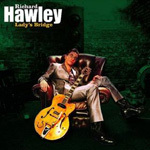|
|
 |
Dusted Reviews
Artist: Richard Hawley Album: Lady's Bridge Label: Mute Review date: Oct. 24, 2007 |

|
|
|
 |
As he moves further into a solo career built around full-tilt croon and immaculate pop production, it is key to remember just how good Richard Hawley is at what he does. Unlike fellow crooner and former Pulp bandmate Jarvis Cocker, Hawley doesn’t drag his songs through post-punk debris, but reaches back much further, muting his Gene Pitney and Everly Brothers notes with an adult resignation. This tactic precludes the ironic detachment that lends Pulp its relevance, and if their trick is to affirm old-school emotional delivery as a necessary tool in the fight against modern ennui, Hawley’s solo work represents the next stage: immersion in nostalgia for the sake of comfort.
With this in mind, the accusatory bell of revivalism can be rung until an arm falls off, but one only need look at Beirut’s two albums for an example of how difficult it is to pull this sort of thing off. As of late, Mr. Condon has been more than upfront about his fondness for Jacques Brel, and his consistently excellent production helps the best tracks approach Brel’s timeless swoon. Unfortunately, Beirut’s ideas write checks that the songs often cannot cash, and the overstuffed arrangements reveal the work for what it is: a conceit. The albums feel like an exploitation of the past, rather than a useful appropriation, and Hawley’s sleek and tasteful sketches shine in comparison.
Lady’s Bridge presents more of the same gorgeously orchestrated odes to love lost and seized that populated 2005’s excellent Coles Corner, with Hawley again rooting the tracks in his native Sheffield. He understands the power of mixing the undeniably personal with a shared musical history – this is what Elvis, Sinatra, Ella Fitzgerald, The Platters, etc. knew – and as such, all he then has to do is deliver simple, elegant lyrics on weighty subjects to seal the deal. “Valentine” is the most successful example, with the chorus of ”And I don’t need no Valentines no no / Don’t need no roses / Cos they just take me back in time no no / Now you’re not here,” riding crashing drums and a lovingly arranged string section. Rather than shamelessly strive to add to the canon, Hawley’s songs peacefully co-exist with their influences.
If the album lacks the overwhelming emotion of Leonard Cohen, another obvious influence, it is because Hawley refuses to invest the minutiae of daily life with the same apocalyptic urgency. However, when he sings to a lover on the title track, ”Now that our lives turned out so bad / We lost the dreams that we once had / We can watch the river flow / And maybe make this city slow / Take me with you when you go,” it’s obvious that a personal pain is being explored in realistic, every day terms. Life is not experienced as one apocalypse after another, and that an album so indebted to the past can move on emotionally on these terms is cause for applause.
By Brad LaBonte
|







